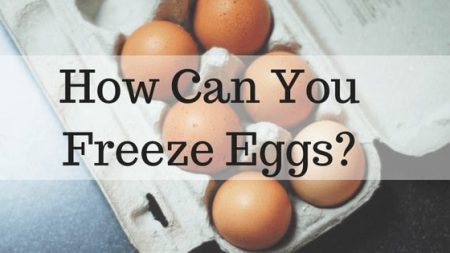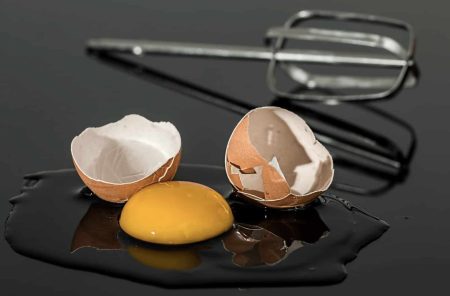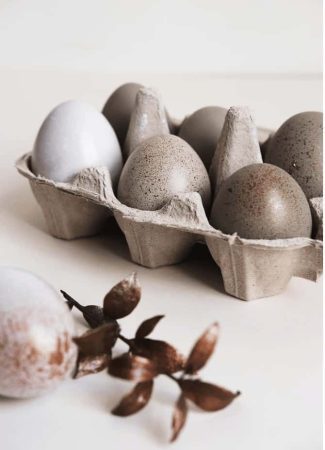Have you ever wondered for yourself, “Can you freeze eggs?” Eggs make up an important part of most diets. But quick and easy access to fresh eggs is not always possible. Freezing eggs and storing them could give you access to a large variety of meals and baked goods. Long after the eggs laid. Here’s everything you need to know about freezing eggs. Managing and storing perishables is no easy task. Homegrown fruits and vegetables will need to store in cold, humid environments. Like root cellars to prevent spoilage.
Oils and various kinds of butter last longer, but too much direct sunlight can cause them to go rancid. Grains, boxes, and canned foods may seem like the only solution, for any family hoping to remain prepared for any emergency. These foods generally make up the backbone of any family’s preparedness plan. But tend to do no favors for taste and variety. For most perishables, storage may only last a month or less. Luckily, that is not the case when it comes to eggs.

No products found.
Can you Freeze Eggs?
With the proper storage technique, eggs can keep for far longer than dairy products, bread, and other perishables. Farmers with too many eggs or families wanting to make their food last longer should have no fear of eating eggs that have been frozen for weeks or even months. Eggs can even separate whites from yolks. To make sure that you have the right product you need whenever it’s time to get cooking. So can you freeze eggs? Absolutely!
Freezing eggs is safe and even noted as such by the United States Department of Agriculture. If you’re interested in freezing eggs, here are a few ways to get started:
The Ice Cube Tray Method
The simplest and most popular way to freeze eggs is the ice cube tray method. As the name suggests, you’ll only need an ice cube tray and a method to store the frozen eggs. Take fresh eggs or eggs that remain well within their use-by date. The healthier the egg before freezing, the lower the chance your food will spoil. Crack open the shell of the egg and place the whites and yolks into individual ice cube slots.
There’s nothing special to do with the tray itself. Other than ensuring you’re working with a clean surface.
Storing your Frozen Eggs
After removing as much of the shell as you can. You can place your eggs in a freezer either overnight or until the eggs are frozen completely solid. Afterward, we’ll need to remove them from the ice cube tray.
Storage from here can be done in several different ways. Freezer bags are the most popular option, but any airtight storage container will do. These frozen eggs will keep for about a year. It might seem redundant, but be sure to check in with the temperature of your freezer. Before entrusting it to keep your eggs long-term. The Food and Drug Association recommends frozen eggs. Be kept at zero degrees or cooler.
So it is best not to take any chances. If you’re freezing large batches of eggs or intend to keep your eggs as emergency food. Be careful to write the exact date of freezing on your container. This will help you make sure that you remain within the year-long use-by date. As with all frozen foods, if you find your eggs look or taste odd after thawing, discard the entire batch immediately. While this issue may stem from freezer burn, it is better to be safe than sorry.
This method of freezing eggs remains the simplest—and you don’t even need to use an ice cube tray. Any clean surface that allows you to freeze the eggs, like a cupcake tray or small plastic cubs, will do. It might be best to find a container with some give, to help you remove the frozen eggs without shattering them.
The Problem with Frozen Whites and Yolks

Freezing eggs remain safe, but you will soon find that frozen eggs don’t act in quite the same manner as fresh eggs after thawing. We already know that the transportation of eggs from the farm to the home can be complex enough with refrigeration. So we need to be as careful when thawing frozen eggs. Thawing your eggs should be done gradually, and should generally be treated much like defrosting meats like beef or pork. Thaw your eggs in the refrigerator rather than out in the open, and allow enough time to thaw completely.
Try to cook with your eggs immediately after thawing, and never attempt to thaw eggs with hot water or in the microwave. Doing so can pose a serious risk to both the flavor and the safety involved with eating the egg. The complex structure of the egg yolk is generally compromised by the freezing and thawing process. Eating the yolk remains safe but separating egg whites and yolks can be difficult, or downright impossible to do with thawed eggs. For that reason, we recommend separating your egg whites and egg yolks before freezing. That is if you intend to make meals that call for separated eggs.
Knowing that far in advance might be difficult, but it can be helpful to err on the side of caution. Freezing eggs in this manner remains no different than freezing whole individual eggs. In fact, separated egg whites and egg yolks can be frozen together with the whites and yolks from other eggs. This could save valuable space in a freezer loaded with other foods or emergency items. While not required for freezing, some suggest taking extra precautions when freezing yolks individually. Since egg yolks tend to gelatinize when freezing, you may want to add a pinch of salt with every frozen yolk. This should help the yolk keep for freshness.
Finally, if you’re worried about the difficulty in dealing with egg white and egg yolks, your eggs can always be blended before freezing. This is great for those who hope to cook baked goods with their eggs or prefer scrambled eggs instead.
Freezing Cooked Eggs
Freezing raw eggs allows for greater versatility when planning for meals or emergencies. But freezing cooked eggs isn’t impossible, either.
Hard-boiled egg yolks are great for salads and sandwiches. And can also be frozen for long-term preservation. Starting this process with a hard-boiled egg is important. Cook your eggs for at least twelve minutes while completely submerged in boiling water. If necessary, cut open one egg for immediate use to make sure that the yolk is cooked thoroughly. To freeze a hard-boiled egg yolk, remove the cooked yolk from the white.
Then load into a freezer bag or other container. Be careful with these. Yes, as they can crush or smear before freezing. However, this generally makes for a messier thawing process. But these will keep as long as raw eggs, so make sure to label the eggs for future reference. Unfortunately, whole hard-boiled eggs and other forms of cooked eggs aren’t able to be safely frozen.
Cooked egg whites generally cannot withstand the freezing and thawing process without compromising on texture and taste. While it may be possible to do so without the risk of foodborne illness. It will not taste very good.
Texture, Taste, and Usage
Even though frozen and thawed eggs act much like fresh eggs, it’s important to realize that no frozen and thawed food will compare to fresh ingredients.
Freezing eggs can be helpful in emergency situations. But if you’re planning on freezing eggs simply for better storage preservation, try to plan with what you’re cooking.
As we’ve mentioned before, frozen eggs are great for use in baked goods. Any product where the egg aids in consistency but not in flavor will most likely not taste any different than if you had chosen to use fresh eggs. Eating scrambled eggs or making meals based entirely on eggs will fare differently. If you intend to use your frozen eggs for these purposes, choose the freshest eggs you can and freeze them immediately.
In general, frozen eggs will taste more rubbery and less distinct than their fresh counterparts.
This comes mostly from the egg yolk, which can gelatinize somewhat during the cooling and freezing process.
Final Thoughts
While the answer to the question of “can you freeze eggs.” remains an enthusiastic yes, it’s clear that several considerations need to be made. Remember the following:
- Never freeze eggs without first removing the shells
- Frozen eggs will last up to a year.
- Consider separating whites and yolks before freezing.
- Never freeze cooked egg whites or scrambled eggs.
Frozen eggs can allow for less food waste and better preparation for future meals. While perishables like eggs are quickly snatched from store shelves in times of emergency, keeping frozen eggs will make sure you never have to worry. Simply pull out your eggs, thaw, and start cooking. So next time somebody asks “can you freeze eggs?” be sure to let them know that there’s no harm in keeping your fresh food around for a little while longer.

No products found.
Becky is a wildlife enthusiast and pet and livestock care expert with a diploma in canine nutrition. With over a decade of experience in animal welfare, Becky lends her expertise to Simple Family Preparedness through insightful info about pets, livestock, bee keeping, and the practicalities of homesteading.
Last update on 2024-07-26 at 23:36 / Affiliate links / Images from Amazon Product Advertising API

